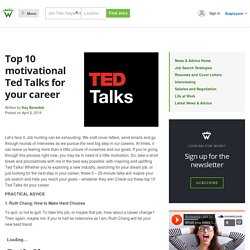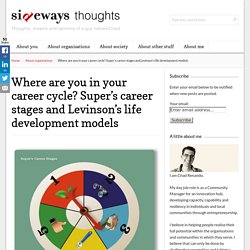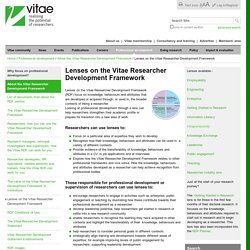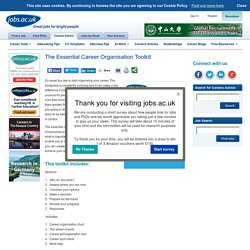

Change Management Tool (extended) Top 10 motivational Ted Talks for your career - Workopolis. Let’s face it.

Job hunting can be exhausting. We craft cover letters, send emails and go through rounds of interviews as we pursue the next big step in our careers. At times, it can leave us feeling more than a little unsure of ourselves and our goals. If you’re going through this process right now, you may be in need of a little motivation. So, take a short break and procrastinate with me in the best way possible: with inspiring and uplifting Ted Talks! 1. To quit, or not to quit. 2. For those of you returning to work after a break, this one will help you get back into the work force and succeed in your new journey. 3. We all get a little stressed sometimes, especially while we’re job searching. 4. Have you got an interview coming up? 5. Captivate your interviewer right off the bat. 6. I realize this one doesn’t sound all that inspiring, but trust me, this Ted Talk has a provocative way of challenging you to pursue your passion. 7.
Be careful! 8. 9. 10. [youtube. Where are you in your career cycle? Super’s career stages and Levinson’s life development models. I recently wrote about how our choice of careers can be largely determined by culture and genetics.

What about our path within that career choice? Are we predestined to perform a certain way based on a prescribed career stage? I consider these questions in light of the changes in Australian politics this week. At least one person has had to unexpectedly reassess her career options and both Julia Gillard and Kevin Rudd are entering into new potential stages in their careers. In doing so they are sharing in what is experienced by the wider working population on a regular basis. Careers as cycles Viewing careers in stages aligns with a perspective that much of life happens in cycles. Career theorist Donald Super articulated a similar cycle to our careers in his life-span and life-cycle approach to career development. Others such as Daniel Levinson generalized these stages to age ranges: Research has confirmed that cycles exist, but they can often be in the form of “mini-cycles”.
Gender. Business Model You Preview. The career-wise researcher Vitae 2013. Career management for researchers. Charting a Course for a Successful Research Career: A Guide for Early Career Researchers - 2nd edition. Lenses on the Vitae Researcher Development Framework. Lenses on the Vitae Researcher Development Framework (RDF) focus on knowledge, behaviours and attributes that are developed or acquired through, or used in, the broader contexts of being a researcher.

Looking at professional development through a lens can help researchers strengthen their academic profile or prepare for transition into a new area of work. Researchers can use lenses to: Focus on a particular area of expertise they wish to developRecognise how their knowledge, behaviours and attributes can be used in a variety of different contextsProvide evidence of the transferability of knowledge, behaviours and attributes in a CV, in job applications and at interviewsExplore how the Vitae Researcher Development Framework relates to other professional frameworks and vice versa. How the knowledge, behaviours and attributes developed as a researcher can help achieve recognition from professional bodies The lenses Employability lens Engineering lens Enterprise lens Information Literacy lens. Career Planner Toolkits. The Essential Career Organisation Toolkit. It’s never too late to start organising your career.

The workplace is constantly evolving and it can make a big difference if you can adapt and move with it. It’s not unusual for people to change their career several times over their working life or design their career to give them greater freedom and flexibility. If you can be pro-active in driving your future you are much more likely to be satisfied, fulfilled and have a sense of being in control. The essential career organisation toolkit offers a range of resources and information to help you to explore what is important to you in your life and career. It aims to enable you to consider your options, understand how you can create opportunities and then set goals to achieve your short and long-term objectives.
This toolkit includes: Sections Why do you work? Activities Career organisation chartThe wheel of workCareer self-exploration toolCareer spot checkMind map Who is this toolkit for?